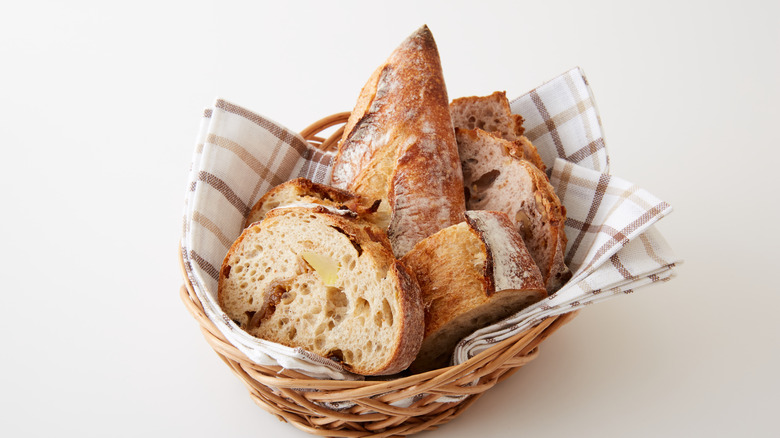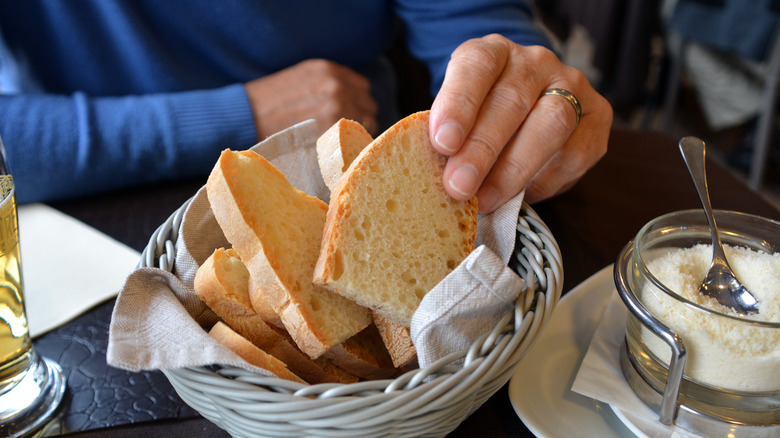Do Restaurants Really Recycle Bread Baskets, Like Anthony Bourdain Said?
One outrageous claim that the late, great Anthony Bourdain shared in his seminal book "Kitchen Confidential" is that restaurants regularly recycle uneaten bread from complimentary bread baskets. In the book, he described the bread basket fact as an "open secret" for people inside the industry. While he certainly didn't suggest that every single restaurant does this, he did label it "standard practice." But does this really happen commonly, or was Bourdain simply taking some creative license in his descriptions?
It's a difficult case to assess: Re-serving a customer's uneaten bread (or any other food) is illegal and would go against health codes, so restaurants would be unlikely to own up to this behavior if asked. There are still stories of restaurants recycling bread in online spaces like advice columns, and from people claiming to have encountered the practice as workers or customers on blogs or forums like Quora and Reddit. On such sites, servers have indicated that bread is one of the things they wouldn't eat from their workplace for this reason. But at the same time, those discussions also feature plenty of pushback from other industry folks indicating that they always ditch the bread after it's been served once, and that any (good) restaurant should know better. Based on this (very anecdotal) evidence, it seems that recycling bread baskets probably happens in some establishments that are lax with the rules, but it also probably isn't as ubiquitous as Bourdain implied.
How concerning is recycled bread, anyway?
Since a restaurant likely wouldn't admit to recycling bread, it might be worth keeping an eye out for other signs that the establishment cares (or not) about cleanliness — checking out how tidy the bathrooms are is one way to do this. If the place is generally nice and tidy, it's probably trustworthy when it comes to following the health code (be it with bread baskets, food handling, or anything else).
But if you really can't help but worry about the bread, there's some evidence that can put you at ease. First, research by the Centers for Disease Control and Prevention has indicated that many food poisoning cases can be traced to restaurant workers (not other customers, as would be the case in recycled bread). Second, bread is really not a common cause of food poisoning. Meat and leafy greens are much more common sources of food poisoning, and food poisoning from bread doesn't really factor into statistics in a notable way. Even though the (arguably minimal) risk of getting served recycled bread certainly has an ick factor for some people, it's probably not a reason to fear for your health — and if you're choosing responsible, high-quality restaurants, the owners and staff would be unlikely to take the risk of getting caught breaking the health code.
There's one reason you're less likely to get recycled bread now
"Kitchen Confidential" was published nearly a quarter-century ago, and the industry has undoubtedly changed somewhat since the year 2000. One notable change is that restaurants have generally been tightening their belts when it comes to freebies like bread (as well as free tortilla chips, in some restaurants). Free bread adds up for restaurants — potentially into the 10s of thousands of dollars per year, and it's become more expensive over the years. So, there's no shortage of restaurants that have started charging for bread, or at least only offering free bread on request.
As a result, you're less likely to get recycled bread for the obvious reason that you're less likely to get any free bread at all. It's still possible that restaurants that are charging for bread could recycle the uneaten stuff. But if customers are ordering and paying for bread, they're probably more likely to eat it, leaving less to recycle at all. (Plus you'd hope that restaurants wouldn't recycle something that they're charging for.) But if you're dining at one of the shrinking number of restaurants with free bread restaurants, there's a chance the recycling might still be going on — so grab those rolls at your own risk.


